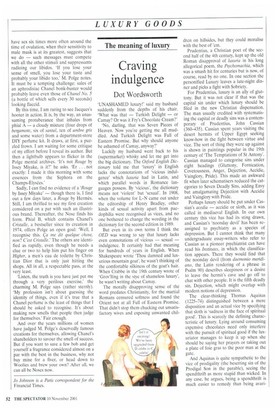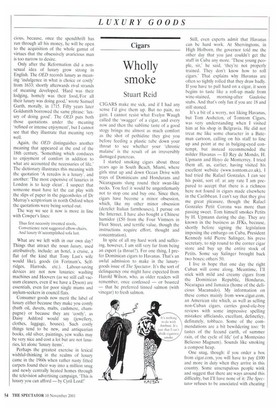The meaning of luxury
Craving indulgence
Dot Wordsworth
'UNASHAMED luxury!' said my husband suddenly from the depths of his chair. 'What was that — Turkish Delight — or Camay? Or was it Fry's Chocolate Cream?'
'No, darling, that was Seven Pieces of Heaven. Now you're getting me all muddled. And Turkish Delight was Full of Eastern Promise. But why should anyone be ashamed of Camay, anyway?'
Luckily my husband went back to his (supermarket) whisky and let me get into the big dictionary. The Oxford English Dictionary told me that 'luxury' in English lacks the connotations of 'vicious indulgence' which luxuria had in Latin, and which parallel words in Romance languages possess. By 'vicious', the dictionary means not 'violent' but 'sexual'. In 1908, when the volume for L–N came out under the editorship of Henry Bradley, other kinds of sexual activity apart from paedophilia were recognised as vices, and no one bothered to change the wording in the dictionary for the second edition in 1989.
But even in its own terms I think the OED was wrong to say that luxury lacks even connotations of vicious — sexual — indulgence. It certainly had that meaning for hundreds of years in English. When Shakespeare wrote 'Thou damned and luxurious mountain goat', he wasn't thinking of the comfortable silkiness of the goat's hair. When Crabbe in the 19th century wrote of 'Grov'lling in the stye of shameless luxury', he wasn't writing about Camay.
The morally disapproving sense of the word predates Christianity, for the martial Romans censured softness and found the Orient not at all Full of Eastern Promise. That didn't stop them chucking out unsatisfactory wives and exposing unwanted chit dren on hillsides, but they could moralise with the best of 'em.
Prudentius, a Christian poet of the second half of the 4th century, kept up the old Roman disapproval of luxuria in his long allegorical poem, the Psychomachia, which was a smash hit for centuries but is now, of course, read by no one. In one section the personified Luxury leaves a late-night dinner and picks a fight with Sobriety.
For Prudentius, luxury is an ally of gluttony. But it was not clear if that was the capital sin under which luxury should be filed in the new Christian dispensation. The man usually credited with systematising the capital or deadly sins was a contemporary of Prudentius, John Cassian (360-435). Cassian spent years visiting the desert hermits of Upper Egypt seeking know-how in the fight between virtue and vice. The sort of thing they were up against is shown in paintings popular in the 19th century of 'The Temptations of St Antony'. Cassian managed to categorise sins under eight headings (Gluttony, Fornication, Covetousness, Anger, Dejection, Accidie, Vainglory, Pride). This made an awkward fit when later schematisers reduced the categories to Seven Deadly Sins, adding Envy but amalgamating Dejection with Accidie and Vainglory with Pride.
Perhaps luxury should be put under Cassian's acedia — accidie or sloth, as it was called in mediaeval English. In our own century this vice has had its sting drawn, and Cassian's 'noonday devil' has been reassigned to psychiatry as a species of depression. But I cannot think that many undergraduate essay-writers who refer to Cassian as a pioneer psychiatrist can have read his Institutes, in which the classification appears. There they would find that the noonday devil (from daemonio meridiano, the Latin rendering of a phrase in Psalm 90) describes sleepiness or a desire to leave the hermit's cave and go off to chat with other people. It is the fifth deadly sin, Dejection, which might overlap with modern notions of depression.
The clear-thinking Thomas Aquinas (1225-74) distinguished between a mere disposition and an actual vice by specifying that sloth is 'sadness in the face of spiritual good'. This is scarcely the defining characteristic of luxury. Lying around consuming expensive chocolates need only interfere with the pursuit of spiritual good if the luxuriator manages to keep it up when she should be saying her prayers or taking out a plate of foie gras to the poor man at the gate.
And Aquinas is quite sympathetic to the vice of prodigality (the besetting sin of the Prodigal Son in the parable), seeing the spendthrift as more stupid than wicked. In any case, he argues, being a spendthrift is much easier to remedy than being avari cious, because, once the spendthrift has run through all his money, he will be open to the acquisition of the whole gamut of virtues that the obsessively avaricious man is too narrow to desire.
Only after the Reformation did a nonsexual idea of luxury grow strong in English. The OED records luxury as meaning 'indulgence in what is choice or costly' from 1633; shortly afterwards rival strands of meaning developed. 'Hard was their lodging, homely was their food,/For all their luxury was doing good,' wrote Samuel Garth, morally, in 1715. Fifty years later Goldsmith borrowed the same phrase: 'luxury of doing good'. The OED puts both those quotations under the meaning 'refined or intense enjoyment', but I cannot see that they illustrate that meaning very well.
Again, the OED distinguishes another meaning that appeared at the end of the 18th century, 'Something which conduces to enjoyment of comfort in addition to what are accounted the necessaries of life.' The dictionary illustrates this meaning with the quotation 'A reredos is a luxury'. and another: 'The most expensive of luxuries in London is to keep clean'. I suspect that someone must have let the cat play with the slips of paper in the pigeonholes of Dr Murray's scriptorium in north Oxford when the quotations were being sorted out.
The way we see it now is more in line with Cowper's lines:
Thus first necessity invented stools, Convenience next suggested elbow-chairs. And luxury th'accomplished sofa last.
What are we left with in our own day? Things that attract the noun luxury', used attributively, include: an hotel, a cruise, a flat (of the kind that Tony Last's wife would like), goods (in Fortnum's, Selfridges, Harrods, etc.). Labour-saving devices are not now luxuries: washing machines and Hoovers (as we still call vacuum cleaners, even if we have a Dyson) are essentials, even for poor single mums and asylum-seekers in council flats.
Consumer goods now merit the label of luxury either because they make you comfy (bath oil, duvets, malts, cashmere, champagne) or because they are 'costly', as Daisy Ashford would say (jewellery, clothes, luggage, houses). Such costly things tend to be new, and antiquarian books, old silver, paintings, yew walks may be very nice and cost a lot but are not luxuries, let alone 'luxury items'.
Perhaps the greatest exercise in lexical wishful-thinking in the realms of luxury came in the 1960s when rather nasty fitted carpets found their way into a million snug and newly centrally heated homes through the television advertising campaign, 'This is luxury you can afford — by Cyril Lord!'















































































































 Previous page
Previous page